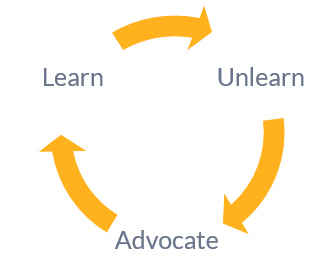Today’s students and educators are living through history.
COVID-19 has catalyzed worldwide school closures and economic uncertainty, while the killings of George Floyd, Rayshard Brooks, Breonna Taylor, Ahmaud Arbery, and countless other Black people have thrown systemic racism and police brutality into sharp relief. Against the backdrop of these “twin pandemics”—racism and COVID-19—educators face uncharted territory. How can school and system leaders address the immense challenges their students and communities face as schools reopen?
The work ahead requires a fully integrated approach to academic and social-emotional development. And in order to meet our vision for educational equity, we must directly acknowledge and address issues of racial equity.
This work will be deep and adaptive: there are no quick fixes or easy solutions. Working for educational equity must be constant and ongoing, and it requires three processes that are sequential as well as iterative: learn, unlearn, and advocate.

We must resist thinking in siloed terms when it comes to social-emotional learning (SEL), academics, and equity. These elements go hand in hand—and we must recognize that we cannot do this work outside of sociopolitical and racial context. An instructional approach that isn’t grounded in racial equity will only perpetuate injustice and inequities.
We’ve identified three principles to guide school- and system-level work in creating an environment that fosters social-emotional learning, academics, and equity. As you engage with each principle, ground your work in the learn, unlearn, and advocate process.
-
Principle 1: Understand what students, families, and the community need and value.
-
Principle 2: Establish a sense of safety and support.
-
Principle 3: Apply best practices from learning science to advance equitable school practice and policies.
By engaging in a process to learn, unlearn, and advocate with these principles, schools and systems can focus on establishing an environment—in-person or virtual—in which they authentically integrate equity-informed social-emotional learning with academic instruction. While context and needed outcomes will be as varied as districts themselves, this framework will guide and inform and an equity-informed approach to this critical work.

Find ANet’s full paper on equity and an integrated approach to social-emotional and academic learning here. In authoring this paper and envisioning this approach, ANet is proud to partner with Transforming Education.
About ANet and TransformEd
At ANet, we work alongside school leadership teams to strengthen their school-wide practice and culture of using learning standards and achievement data to get breakthrough results for students in underserved communities. Across the past seven years, we have committed ourselves to anti-racism: dismantling systems of oppression by addressing structural, institutional, and interpersonal racism.
Our colleagues at TransformEd partner with school and system leaders to identify and implement evidence-based practices and policies that create positive learning environments and support students’ social-emotional development.
